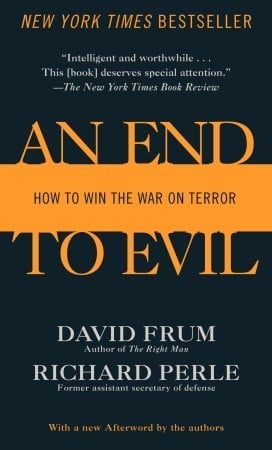This malignant little book, admirably successful in achieving the difficult feat of combining vapidity with nastiness, further exhibits dishonesty, hypocrisy, flattery, cant, and special pleading, in about equal parts. To this list of sins, we can finally add error—of the grossest magnitude. An End to Evil, though published just a few months ago, is not just hopelessly outdated, it is wholly vitiated by subsequent events “on the ground,” in Officialspeak. Really, there is something unsporting about reviewing this crippled book from the present historical vantage point. Fortunately, this hunt does not entail a long chase.
David Frum, the former White House speechwriter of “Axis of Evil” fame, and Richard “Cakewalk” Perle, he of the Department of Defense (more or less), describe their book as a “manual for victory” in the “War on Terror,” which, for them, is almost infinitely more dreadful than the French, Russian, and Maoist Revolutions combined.
For us, terrorism remains the great evil of our time, and the war against this evil, our generation’s great cause. We do not believe that Americans are fighting this evil to minimize it or to manage it. We believe they are fighting to win—to end this evil before it kills again and on a genocidal scale. There is no middle way for Americans: It is victory or holocaust.
Frum and Perle are far too complimentary of their fellow Americans, who, of course, are not “fighting” anything but rather peaceably mall-trotting, watching television, and buying abortions in the peaceful security of their continental fastness. On the other hand, a people that is being asked to commit its country to World War IV, reconfigure the Middle East, and make over as many other countries as the Defense Policy Board might designate may well need a little bucking up—especially when they have nothing to gain and everything to lose in the process. “We must hunt down the individual terrorists before they kill our people or others. . . . We must deter all regimes that use terror as a weapon of state against anyone, American or not.”
For the authors, the war against Al Qaeda necessarily entails war against North Korea, Syria, Iran, and even Saudi Arabia—Chris Matthews’ “Fireman’s >War” for hegemonic revenge. The dragnet is also to enmesh Hamas and Hezbollah, though Hamas has never attacked the United States. Perle-Frum’s agenda is clearly not America’s but someone else’s, though that Someone Else is treated throughout the book as a rather remote bystander, bemused by the geopolitical currents swirling about it, and almost wholly preoccupied by the continuing Palestinian unpleasantness. “The Arab-Israeli quarrel,” Frumperle insist, “is not a cause of Islamic extremism.” If you can believe that, you will also agree with the authors that the second Iraq War was in no way the work of a neoconservative “cabal” operating from the Department of Defense and the office of the Vice President of the United States. Elsewhere, Perlefrum write:
It’s not always in our power to do something about such criminals [as the Ayatollah Khamenei], nor is it always in our interest, but when it is in our power and interest, we should toss dictators aside with no more compunction than a police sharpshooter feels when he downs a hostage-taker.
Is anyone acquainted with people who think that way except neoconservatives?
Neither David Frum nor Richard Perle (who insisted before hostilities commenced that war in Iraq would be a “cakewalk”) has been much heard from of late. That is not to say that they have not prepared in advance an answer to critics churlish enough to throw up to them the wild inaccuracy of their pre-war predictions of easeful victory. “Of all our mistakes,” they write,
probably the most serious was our unwillingness to allow the Iraqi National Congress, Iraq’s leading anti-Saddam resistance movement, to form a provisional government after the fall of Baghdad. In 1944, we took care to let French troops enter Paris before U.S. or British forces. We should have shown equal tact in 2003.
They mean Iraq would be pacified today and preparing to take up the reins of democratic government if only George Bush had handed the country over to >Ahmed Chalabi, one of the biggest crooks and con men in the Middle East and Washington, who has recently been accused of helping to precipitate the war in Iraq by duping the White House into deposing Saddam Hussein, the mortal enemy of his Iranian clients in Tehran, by feeding it and the Defense Department disinformation concerning Saddam’s alleged possession of weapons of mass destruction. The tragedy, and the horror, of the United States today is the near-total ignorance of its leaders and the advisors to those leaders—ignorance not only of history but of the most elemental facts of human nature.
What sort of political and intellectual hacks would write a “manual” purporting to set forward a strategy to defeat evil—the second most powerful metaphysical force in the universe—now and for all time? An End to Evil is not a book about international politics, nor is it a book about reality in any form or at any level. It is, rather, a work of intellectual and moral fantasy, inspired by moral presumption and power-hunger, at whose center, like a large, dark spider, lies the Interest whose name the authors dare not speak. The fantastical quality is the direct result of their need to defend, in rational terms, an insane policy that can be defended only in irrational terms so long as its advocates are unwilling to declare their parti pris. Only in that circumstance could it make any possible sense at all.
[An End to Evil: How to Win the War on Terror, by David Frum and Richard Perle (New York: Random House) 284 pp., $25.95]

Leave a Reply